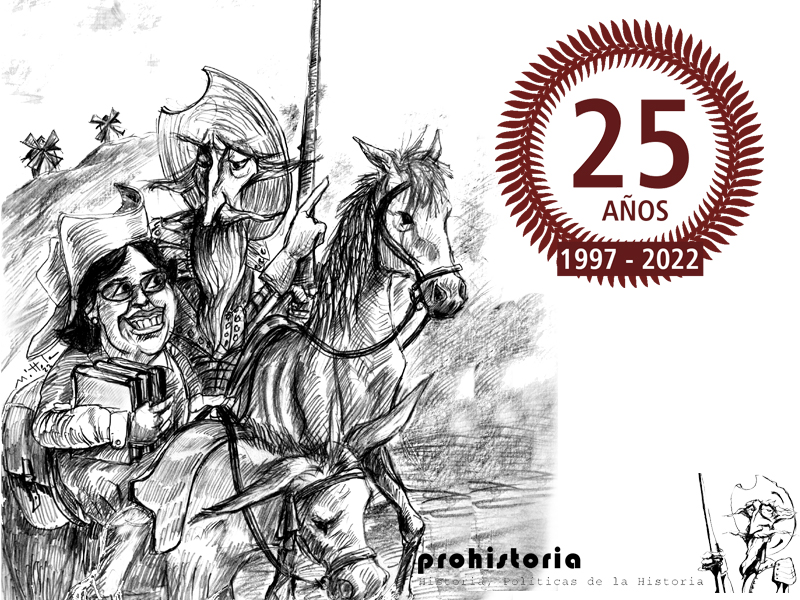Can Economic Theory Survive without a Relationship to History?
DOI:
https://doi.org/10.35305/prohistoria.vi38.1724Keywords:
Economic History, Methodology in Economic History, Quantitative and Qualitative Analysis in Historical ResearchAbstract
Economic history is a frontier discipline: its analytical tools are based on both historical and economic sciences. Precisely for this reason, the fact that a significant part of contemporary economic history is limited to taking as a reference only the contributions of economics and, in particular, of the more strictly quantitative economic analysis, constitutes a serious limitation of its interpretative capacity. On the contrary, it seems essential that economic history be open to receive all the methodological contributions that may come from the historical sciences and, in general, from the social sciences that also make use of the qualitative analysis of historical phenomena.
Downloads
References
Boldizzoni, F. (2011). The poverty of Clio: Resurrecting economic history. Princeton University Press.
Calafat, G. y Monnet, E. (2016). Le retour de l’histoire économique. La vie des idées. Disponible en http://www.laviedesidees.fr/Le-retour-de-l-histoire-economique.html
Cipolla, C. M. (1988).Tra due culture. Introduzione alla storia economica. Il Mulino.
De Matteo, L., Guenzi, A. y Pecorari, P. (Eds.) (2004). Le radici della storia economica in Italia. La costruzione di un metodo. Número monográfico de la revista Storia economica, a. XVII (2).
De Mauro, T. (2004). Economia e linguaggio. En P. Ciocca, G. Toniolo (Eds.), Storia economica d'Italia, vol. III, Industrie, mercati, istituzioni, t. 2, I vincoli e le opportunità. Laterza.
De Rosa, L. (1990). L’avventura della storia economica in Italia. Laterza.
Gallegati, M. (2016).Acrescita. Per una nuova economia. Einaudi.
Grenier, J-Y (1996).L'Économie d'Ancien Régime: Un monde de l'échange et de l'incertitude. AlbinMichel.
Ingrao, B., Ranchetti, F. (2000). Il mercato nel pensiero economico. Storia e analisi di un'idea dall'illuminismo alla teoria dei giochi. Hoepli.
Katzner, D. W.(1989). The Walrasian Vision of the Microeconomy: An Elementary Exposition of the Structure of Modern General Equilibrium Theory. Ann Arbor, University of Michigan Press.
Krugman, P. (1998). The Accidental Theorist and Other Dispatches from the Dismal Science. W.W. Norton & Company.
Latouche, S. (2004). Survivre au développement. De la décolonisation de l'imaginaire économique à la construction d'une société alternative. Mille et une nuits.
McCloskey, D. (2013). The poverty of Boldizzoni: Resurrecting the German Historical School. Investigaciones de Historia Económica, (9), 2-6.
Mirowski, P. (2001). Plus de chaleur que de lumière: l'économie comme physique sociale, la physique comme économie de la nature. Economica.
Mocarelli, L. (2017). Storia ed economia: un matrimonio impossibile?. En D. Andreozzi (Dir.), Quantità/qualità: La storia tra sguardi micro e generalizzazioni. New Digital Frontiers.
North, D. (2005).Understanding the Process of Economic Change. Princeton University Press.
North, D., Wallis, J.J. y Weingast, B. R. (Eds.) (2012).Violence and Social Orders. A Conceptual Framework for Interpreting Recorded Human History. Cambridge University Press.
Porro, A. (1989). Storia e statistica. Introduzione ai metodi per la ricerca storica. Nuova Italia Scientifica.
Roncaglia, A. (2001). La richezza delle idee: storia del pensiero economico, Roma. Laterza.
Roncaglia, A. (2016). Breve storia del pensiero economico. Laterza.
Sen, A. (1992). Inequality Reexamined. Clarendon Press/ Oxford University Press.
Solow, R. M. (1986).Economics: is Something missing, in W.N. Parker, Economic history and the Modern economist. Blackwell.
Stiglitz, J. (2003). The roaring nineties: a new history of the world's most prosperous decade. W.W. Norton & Company.
Sylos Labini, P. (1971). Problemi dello sviluppo economico. Laterza.
Sylos Labini, P. (2005). Torniamo ai classici. Produttività del lavoro, progresso tecnico e sviluppo economico. Laterza.

Published
How to Cite
Issue
Section
License

This work is licensed under a Creative Commons Attribution-NonCommercial-ShareAlike 4.0 International License.
- Authors retain copyright and grant the journal right of first publication with the work simultaneously licensed under Creative Commons Attribution 4.0 International License.
- Authors are able to enter into separate, additional contractual arrangements for the non-exclusive distribution of the journal's published version of the work (e.g., post it to an institutional repository or publish it in a book), with an acknowledgement of its initial publication in this journal.
Copyright of this issue © Prohistoria. Historia, políticas de la historia


















